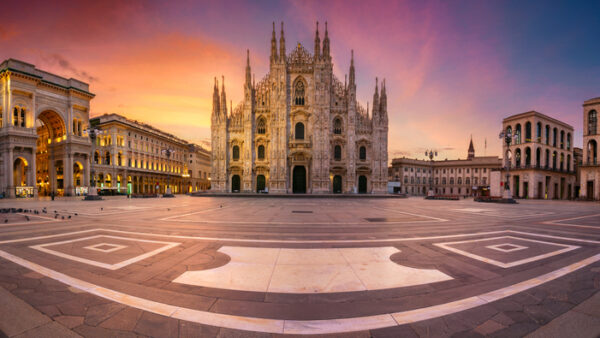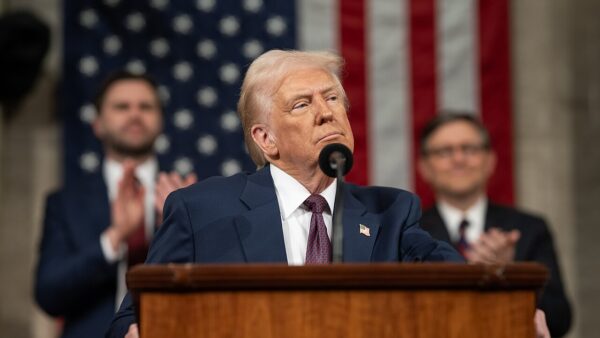Saudi Arabia’s bid to attract billions worth of investment to build vast new city developments has been tarnished by the disappearance and alleged state assassination of the Saudi journalist and regime critic, Jamal Khashoggi.
World Bank president Jim Yong Kim, Sir Richard Branson, and Uber CEO Dara Khosrowshahi are among the luminaries who last week pulled out of a glittering international conference scheduled for later this month, or who have suspended dealings with the Saudi regime.
Last night the chief executive of JPMorgan Chase, Jamie Dimon, and Ford Motor Company chairman Bill Ford cancelled their attendance at the Future Investment Initiative (FII), nicknamed “Davos in the Desert”, scheduled for 23-25 October in Riyadh.
Today, more financiers bailed. BlackRock CEO Larry Fink, Blackstone CEO Stephen Schwarzman and MasterCard CEO Ajay Banga will not be attending, reports CNBC.
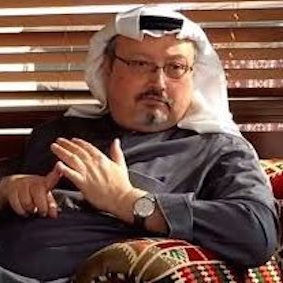
Jamal Khashoggi’s Twitter profile picture
Jamie Dimon and Stephen Schwarzman were due to speak at the conference.
Branson last week broke off talks over a $1bn Saudi investment in his Virgin space firms, and suspended his directorships in two Red Sea tourism projects, as anger and alarm mounted over the unexplained disappearance on 2 October of Khashoggi after he entered the Saudi consulate in Istanbul and reportedly never came out.
If the allegations against the kingdom are true, Branson said last week, it would “change the ability of any of us in the West to do business with the Saudi Government”.
Prominent media organisations including the New York Times, Financial Times, The Economist, CNN and Bloomberg have also cancelled sponsorship of, or speeches at, the FII conference.
Ambitious plans
Saudi Arabia’s de facto ruler, Crown Prince Mohammad bin Salman, has staked his “Vision 2030” plans for modernising the Saudi economy on foreign investment to fund huge business, tourism and entertainment developments. He is chairing the FII conference.
Developments include “Neom”, a planned $500bn high-tech city to be built from scratch in the country’s northwest, intended as a 26,500-sq-km global haven for futuristic business sectors.
Neom has been infected by the Khashoggi affair as well, with a number of high profile figures quitting an advisory board for the project announced only last week.
Listed on the board are leaders in technology, property, architecture and engineering, including architect Norman Foster, property magnate Rob Speyer, of Tishman Speyer, and chairman of ABB, Peter Voser.
But last week saw a number of defections, including those of former US secretary of energy Ernest Moniz; Alphabet executive Dan Doctoroff (Alphabet is Google’s parent company); Neelie Kroes, a former vice president of the European Commission; and Sam Altman, partner at venture capital firm Y Combinator.
Lord Foster’s firm, Foster + Partners, did not immediately respond to GCR’s request for comment.
Another top-flight executive, Apple’s chief design officer, Jony Ive, said his original inclusion on the board was a mistake.
Bin Salman announced other eye-catching development schemes last year, including a 34,000-sq-km high-end tourism region on the Red Sea coast, and a 334-sq-km “entertainment city” on the outskirts of Riyadh, called Qiddiya, for sport, culture and recreation.
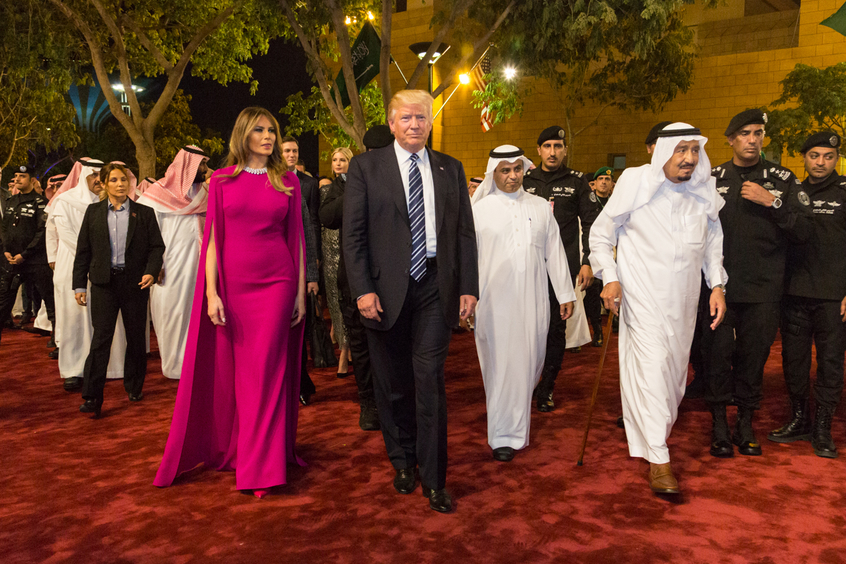
President Donald Trump and First Lady Melania Trump visit Murabba Palace, Riyadh, Saudi Arabia, escorted by King Salman bin Abdulaziz Al Saud, on 20 May 2017 (Official White House Photo by Shealah Craighead)
This year’s FII was designed to enthuse the international business world about these schemes, and speakers announced in September include leading lights in the global firmament of banking, business and technology.
Outspoken critic
Jamal Khashoggi, whose 60th birthday was on Saturday, had been a prominent journalist in Saudi Arabia with close ties to some in the kingdom’s large royal family. But his sympathy for Muslim Brotherhood-style political reform caused friction with the new activist regime of bin Salman, writes author and Saudi expert John R. Bradley.
Khashoggi entered self-imposed exile in the US in September last year, from where he used his column in the Washington Post to criticise bin Salman’s hardening authoritarianism and the kingdom’s war in Yemen. He appeared frequently as a commentator on major TV networks.
Although he feared for his safety, on 2 October Khashoggi entered the Saudi consulate in Istanbul to get paperwork necessary for his planned remarriage.
Reports say he tried to get the documents from the Saudi embassy in Washington, but had been directed by Saudi officials to Istanbul. On his first visit to the consulate there, he was told to return on another day, which he did on 2 October. His fiancée, friends and Turkish authorities say he never re-emerged.
Turkish security sources claim to have audio and video recordings of Khashoggi being tortured and killed in the consulate. They say his body was dismembered and removed in boxes. Turkish media allege that a 15-man hit squad flew in from Saudi Arabia on chartered jets and entered the consulate before Khashoggi did.
Saudi Arabia strenuously denies any links to the journalist’s disappearance, but has not offered an alternative account and, as of yesterday, had still not allowed Turkish investigators into its consulate. It is reported that a search will take place today.
Gathering fallout
As its business week began on Sunday, Saudi Arabia’s stock market plunged 7%, the biggest drop since December 2014 amid the collapse in the price of oil. Traders told Reuters that some local stock owners were panic selling because they feared the Khashoggi affair would disrupt the influx of investment from abroad.
Those fears may have been heightened by US President Donald Trump’s bellicose words over the weekend, when he said the US would inflict “severe punishment” if Turkey’s accusations against the Saudi state proved true, although he would not commit to sanctions or halting arms sales.
The Crown Prince’s flagship FII conference looked even more vulnerable yesterday when diplomatic sources told the BBC that the US and UK were considering boycotting it. Steve Mnuchin, Trump’s Treasury Secretary, and UK International Trade Secretary, Liam Fox, were both mulling staying away from bin Salman’s “Davos in the Desert”, sources said. Earlier, on Friday, Mnuchin had said he was still planning to attend.
Also yesterday, the foreign ministers of the UK, France and Germany issued a joint statement calling on the Saudi government to provide a “complete and detailed response”.Â
Much to lose
Mohammad bin Salman has energetically courted favour in the West, undertaking a grand tour earlier this year encompassing Buckingham Palace, the White House, Silicon Valley and even Hollywood.
For this reason, withdrawals from the FII by the likes of Mnuchin, if it happens, the World Bank’s Jim Yong Kim and Sir Richard Branson will hurt bin Salman’s nascent reputation as a liberal reformer.
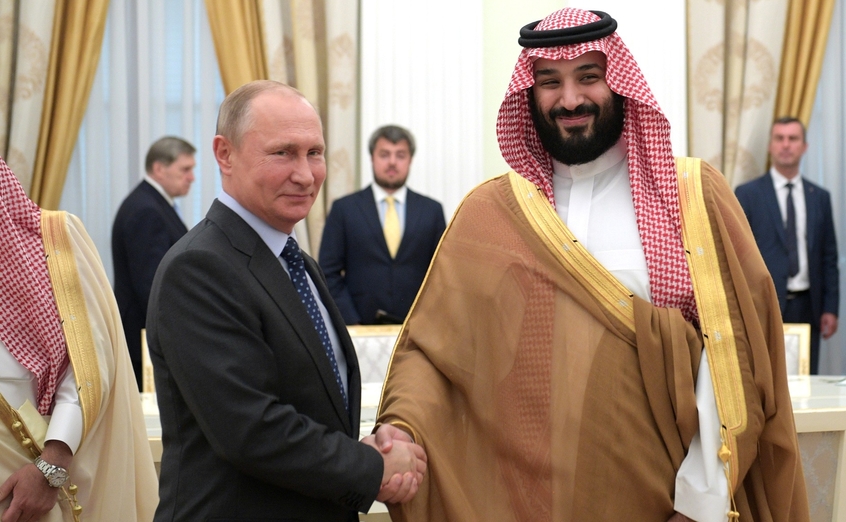
Saudi Crown Prince Mohammad bin Salman, right, with Russian President Vladimir Putin during the 2018 World Cup (The Kremlin)
Particularly injurious will be the snub of Branson, who stood to gain $1bn investment from Saudi Arabia’s sovereign wealth fund, known as the Public Investment Fund (PIF), in his companies Virgin Galactic and Virgin Orbit.
“What has reportedly happened in Turkey around the disappearance of journalist Jamal Khashoggi, if proved true, would clearly change the ability of any of us in the West to do business with the Saudi Government. We have asked for more information from the authorities in Saudi and to clarify their position in relation to Mr Khashoggi,” Branson said Thursday.
Also standing to lose is Dara Khosrowshahi, whose ride-hailing company Uber got a $3.5bn investment by the PIF in 2016, making the PIF, controlled by bin Salman, a major shareholder.
“I’m very troubled by the reports to date about Jamal Khashoggi. We are following the situation closely, and unless a substantially different set of facts emerges, I won’t be attending the FII conference in Riyadh,” he said in a statement reported by CNN.
World Bank president Jim Yong Kim had earlier withdrawn from speaking at FII, a bank spokesman told the Financial Times on Friday (12 October), declining to say when the president withdrew. Jim Yong Kim was still listed as a speaker on the FII website today.
The New York Times canceled its sponsorship of the FII event on Wednesday, reports the Guardian, sparking a stream of withdrawals elsewhere.
Figures pulling out of the FII conference last week include Huffington Post founder Ariana Huffington, who now runs health and wellbeing company Thrive Global; Bob Bakish, head of mass media conglomerate Viacom; billionaire Patrick Soon-Shiong, owner of the LA Times; AOL co-founder and venture capitalist Steve Case; Joanna Popper, Global head of entertainment virtual reality at IT giant, HP; and Economist editor-in-chief, Zanny Minton Beddoes, who was due to speak.
An FII spokesman said on Saturday that the FII will go ahead. “Despite the disappointing withdrawal of some speakers and partners, we look forward to welcoming thousands of speakers, session managers and guests from around the world in Riyadh from October 23 to 25,” the spokesman said in a statement.
However, a number of other prominent FII sponsors and attendees have said they are monitoring the situation, so unless the government of Saudi Arabia can convincingly counter Turkey’s claims, more withdrawals are likely.
Top image: The 26,500-sq-km city will be built from scratch in the mountainous desert region on the coasts of the Red Sea and the Gulf of Aqaba (http://discoverneom.com)
Further Reading:

